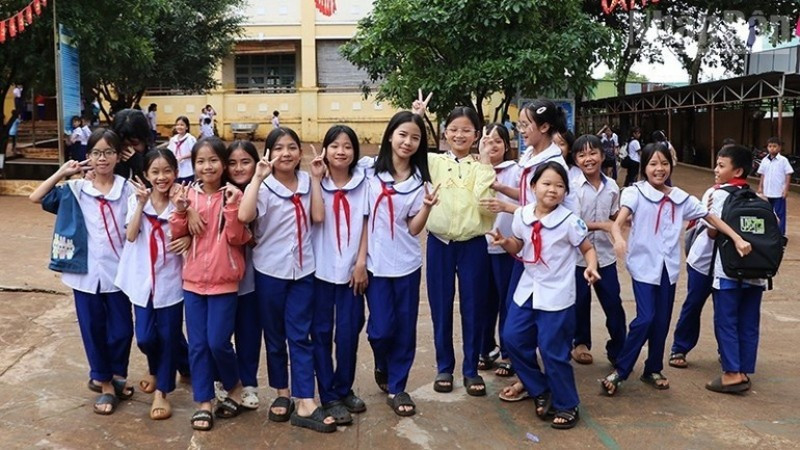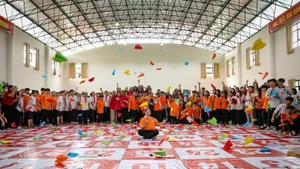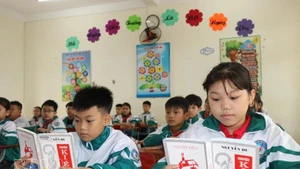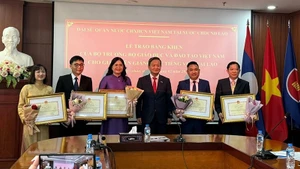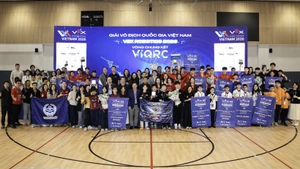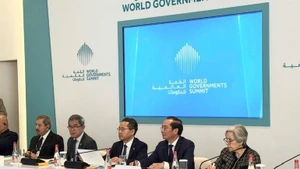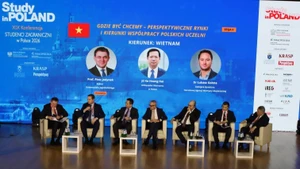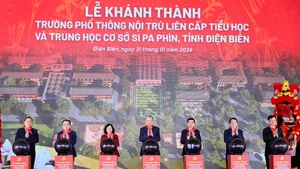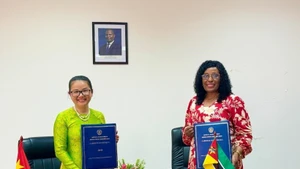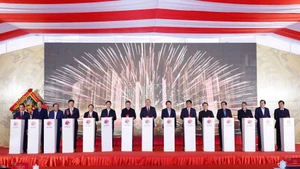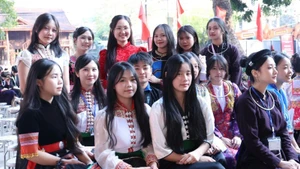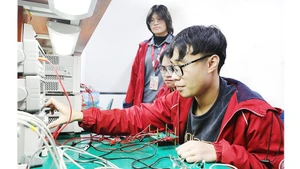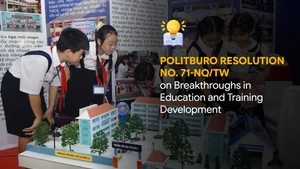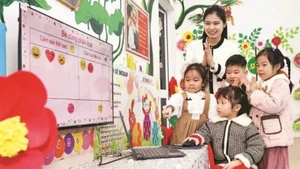The light of knowledge in the nation’s borderlands
In recent years, in line with the Party and State’s guidelines on reorganising and planning the school network, the education sector has made concerted efforts nationwide to streamline the system and improve teaching quality. However, in mountainous, remote, and isolated areas, especially border communes, the maintenance and arrangement of satellite schools remain a significant challenge.
Rugged terrain, poor transport conditions, and frequent floods that isolate communities make the journey to school extremely arduous for many borderland children. In numerous villages, makeshift classrooms, desks assembled from forest wood and old tin roofs continue to “hold the children’s feet at school” through sheer determination and faith.
In a border commune of Thanh Hoa Province, Teacher L.V.T. shared: “Sometimes I have to teach a combined class of three grades; the classroom can only fit a few rows of desks, yet the children still work hard and come to school despite the cold and rain.” Such humble classrooms have kept the written word alive and sustained children’s aspirations, but they also highlight the urgent need for a safer, more sustainable, and more equitable model of education for children in the nation’s borderlands.
Against this backdrop, the implementation of the Politburo’s Conclusion Notice No. 81-TB/TW (dated July 18, 2025), and the Government’s Resolution No. 298/NQ-CP (dated September 26, 2025) on the investment policy for building schools in border communes has opened a strategic pathway.
Speaking at the groundbreaking ceremonies for schools in Si Pa Phin Commune (Dien Bien Province) and Na Ngoi Inter-level Boarding School (Nghe An Province), Party General Secretary To Lam emphasised that investing in schools in border areas is a major policy of profound political, humanitarian, and strategic significance. It is not only about improving learning conditions for ethnic minority children but also about enhancing the livelihoods of borderland communities, strengthening the “people’s defence posture”, and safeguarding national sovereignty from its roots — from the people and from communities bound to the land, forests, border roads, and milestones of the Fatherland.
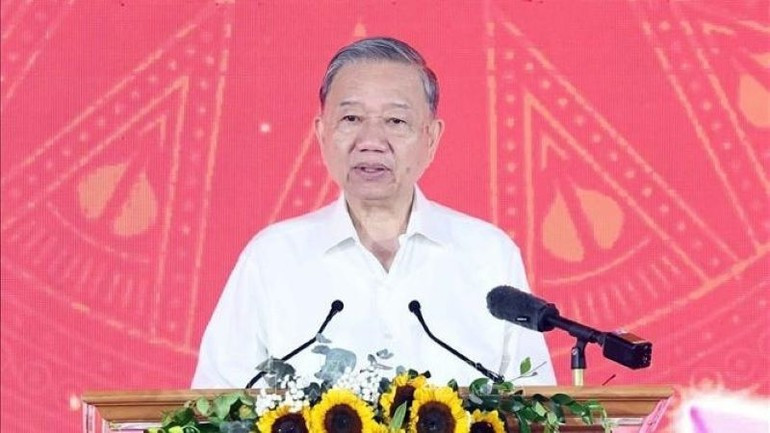
In recent months, the Politburo has tasked the Government Party Commission with directing ministries, agencies, and localities to synchronously build and strive to complete 100 new or renovated schools in 2025, laying the foundation for expanding the inter-level boarding school model in all 248 land border communes. This is a strategic step reflecting the Party and State’s long-term vision in human development, unlocking the potential of border regions, and integrating socio-economic development with defence and security consolidation.
The Government takes decisive action, spreading the light of knowledge to the borderlands
Since early September, Prime Minister Pham Minh Chinh has attended groundbreaking ceremonies for many inter-level boarding schools in border communes, such as Bat Mot (Thanh Hoa) and Tay Giang (Quang Binh).
Specifically, on November 9, 2025, at the main venue of Yen Khuong Inter-level Boarding Primary–Junior Secondary School (Thanh Hoa), connecting with 137 in-person sites and 71 online sites nationwide, the prime minister underscored the strategic and humane significance of education in the borderlands.
He affirmed that in the nation’s borderlands, education is not only the driving force in fostering people but the very foundation of the people’s hearts and the posture of trust.
“To secure the border, the people’s hearts must be at peace; and for them to be at peace, their children must be educated. Wherever knowledge reaches, trust spreads. Every child who goes to school is a ‘little soldier’ on the front of knowledge, contributing to protecting the Fatherland through intellect and character,” the Prime Minister stressed.
Under the Government’s close direction, planning, capital allocation, design, and construction have been accelerated in a synchronised manner. Localities have mobilised diverse resources, combining state budget with social contributions, ensuring practical and effective implementation while avoiding formality and fragmentation. The simultaneous groundbreaking ceremonies at 71 sites became a celebration of trust, unity, and social responsibility.
At the ceremony, the Prime Minister requested ministries, agencies, local authorities, and construction units to focus their utmost efforts on ensuring schedule, quality, safety, and transparency; completing all works by August 2026 at the latest so that they can serve the 2026–2027 school year.
All levels and sectors must stay close to reality, resolve obstacles, and supervise construction with the spirit of “for our beloved students, for the borderland communities”. The Prime Minister said each newly built school is “a work of intellect and heart, a symbol of dedication to the people” and a vivid testament to the decisive leadership of the Politburo, the government, the engagement of ministries and localities, and the consensus of the people.
He conveyed his message to the borderland students: “These new schools are gifts from the Fatherland, symbols of trust, affection, and hope. Study hard, train yourselves, preserve your ethnic identity, and nurture big dreams and aspirations. Knowledge is soft power; it is the foundation of patriotism and the will to rise.”
To date, 28 inter-level boarding schools have begun construction in border provinces such as Dien Bien, Lao Cai, Ha Giang, Cao Bang, Thanh Hoa, Quang Binh, and Tay Ninh. More than simply educational facilities, each school is a “soft milestone” at the border, a place that nurtures trust, raises educational levels, and creates a solid foundation for socio-economic development and for strengthening the all-people national defence posture in the nation’s borderlands.
Toward a learning society in the nation’s borderlands
These days, the atmosphere at the new school groundbreaking sites is truly special. Across the border regions, cheerful laughter mixes with the excitement of teachers, students, and villagers. All share the same belief: in just a few months, borderland children will study in spacious schools with dormitories, playgrounds, libraries, and subject classrooms — things once considered a luxury in the vast mountains.
Teacher Le Thi Thuy of Yen Khuong Primary School (Thanh Hoa) shared emotionally: “We are deeply grateful to the Party and the State for their care for education in the mountains. This is a great source of encouragement for teachers to stay committed and for students to have better learning conditions.”
Student Lo Bao Ngoc of Yen Khuong Junior Secondary School said with a bright smile: “I hope the new school will be completed soon so I can have a place to stay and won’t have to walk such a long distance. I want to become a teacher and teach in my own village.”
Student Lo Xuan Keo from the same school dreams of becoming a border guard soldier so that he can “study and protect my village”.
Such simple aspirations vividly reflect the enduring vitality of education — an unextinguishable light, whether on mountaintops or beside the border markers.
For residents, every new school is a source of joy. Luong Thi Thuy of Yen Khuong Commune shared: “Although the weather has been unfavourable, villagers still came to help clear the site, hoping construction would begin soon so our children can study properly.”
Le Thi Tham expressed her belief that: “Once we have a new school, the children will receive proper education, gain knowledge, and find stable jobs to escape poverty and change their lives.”
Teachers, parents, border guards, and commune police officers are all filled with enthusiasm. For them, every borderland student is a “little soldier”, joining hands to protect the nation’s border through knowledge, patriotism, and the will to rise.
Building a system of inter-level ethnic minority boarding schools in border communes is not only a matter of ensuring educational equity but a strategic investment in the future. Each new school is a “fortress of knowledge”, helping safeguard sovereignty and national security from the roots — from the people and from their hearts.
More importantly, this policy reaffirms the Party and State’s determination to build a nationwide learning society, where every child — whether from the delta or the mountains, whether Kinh or ethnic minority — has equal, sufficient, and humane access to education.
From the first bricks of the new inter-level boarding schools, a belief in a sustainable learning future is being kindled. In the nation’s borderlands, the light of knowledge is the most enduring “soft milestone”, safeguarding the border through intellect, aspirations, and the unwavering trust of people who are deeply bound to their land, forests, and homeland.
One hundred schools – 248 border communes – one shared goal: No borderland child left behind the doorway of knowledge.
